- Home
- Sherry Thomas
The Art of Theft Page 11
The Art of Theft Read online
Page 11
“I don’t know, Ash. I don’t know.” She poured amber liquid into a glass—Calvados, by its aroma—and downed two fingers in one draught. “Until this afternoon I was full of fear for the maharani. But when Mr. Marbleton said he planned to visit the château at night, to go over the fence and get as close to the manor as possible, I—I suddenly became afraid for us. Is it really necessary to reconnoiter in the middle of the night?”
“I’m afraid so.”
Her anxiety was a feeling of constriction around his own heart. Other than for his children, it was for Mrs. Watson that he’d always felt the purest affection, this woman who had watched him grow up and been unwavering in her warm devotion.
She clutched at the empty glass. “But you said invitations would be forthcoming. We’ll be able to walk in the front door.”
“And steal from a place we’ve never seen?” He shook his head. “If we were able to walk through the front door again and again, that would be a different matter. But since we will only be able to do so on the night of the ball—and at the earlier reception, if all goes well—we must know as much about the place and its surroundings as possible. Since there will be few opportunities for approaching during daytime, we have to do what we can at night.”
“I can’t help but think of the people in the château—I don’t know how they are related to those who blackmail Her Highness, but they must be somehow.”
This was his worry, too. And no doubt Holmes’s.
“I’m well aware of the potential dangers, ma’am, as is everyone else here.”
Maybe not so much Miss Olivia, who wasn’t, as of yet, accustomed to thinking of the world in such terms, but certainly Holmes. And most certainly Mr. Marbleton.
“And I am excruciatingly aware of the fact that you are all here because of me.”
He moved closer, took the empty glass out of her grip, and held her hands in his own. “Ma’am, this is exactly where I wish to be. When I needed help, you did everything in your power to provide it. Let me return the favor.”
A sheen of tears came into Mrs. Watson’s eyes. “But when we helped you, Ash, it was because you yourself were in peril. Whereas everyone is only here because of my guilt.”
“You would be here by yourself, working on the maharani’s behalf, if you had to. And you would do that for any of us. We are here not because of any guilt you may be feeling, but because you are the most gallant person any of us has ever had the good fortune to meet.”
Her lips quivered.
He smiled at her and kissed her on the forehead. “So let us be gallant for you. For once.”
* * *
If only gallantry required less suffering.
It started to rain around midnight. Lord Ingram’s long, hooded mackintosh kept most of him dry, but still, it was a miserable business being outside on a wet December night.
Before they’d set out, he and Mr. Marbleton had studied a map of the estate that Mr. Marbleton had brought from Paris, part of the architectural plans. The front gate was at the southern end of the property. The lake on which the manor sat was much closer to the fences on the north side than the front gate. And there is also a chapel, Mr. Marbleton had said, tapping its location on the map, not far from the northern fences, which should hide us from view if we climb in behind it.
They had come to the spot Mr. Marbleton had selected. Copses of woods stood between the château and the village, but outside the fences the trees had been pared back a considerable distance, leaving only bare ground. They waited for a few minutes under the trees, the rain coming down harder and harder. Distantly dogs barked.
Mr. Marbleton glanced at him. He nodded. With feline lightness, Mr. Marbleton shot over the fence. Lord Ingram shook his head—was he himself ever so acrobatic, even at that age? But the fence did not prove an obstacle, even if he made it past without quite the same panache.
A strong gust blew. He wiped the rain from his face. The air smelled faintly of cow manure. It made him think of Stern Hollow, of its herd of twenty that grazed behind the house.
Apropos of nothing at all, he wondered what Holmes thought of the cream and butter produced on his estate.
They ran, crouched low, toward the chapel two hundred fifty feet away. The chapel, which faced east, stood athwart their direct path to the manor. They crept along its long side, until they could peek out a corner toward the château itself, dark except for lamps that burned in the small courtyard on the island.
Which only made everything look more shadowy.
It was another half furlong to the northern edge of the lake. But there would be no more covers of any kind: nothing but water and smooth, flat ground around the manor. The parterres of the formal gardens were a furlong south of the lake, the orchard too distant to even be seen.
“We have to get to the bridge to have a proper look at the château—and to have any kind of hope of concealment,” said Mr. Marbleton, stating the conclusion Lord Ingram had also come to.
They went back to the fence. It offered no concealment, but it was farther away from the illumination—and a quicker way out if the dogs came near. He considered making their way outside of the fence. But they would leave a trail on the wet ground, footprints that might or might not be washed away by the rain. Whereas inside, they had the advantage of an excellent lawn. In summer it would have been as luxuriant as any velvet carpet: He stepped on no mud, only an occasional puddle where the ground was slightly uneven.
They reached the formal garden before the dogs came along the eastern fences, several hundred feet away. Even in the din of the rain, the canine growls carried, low, menacing vibrations. He hoped those were only growls of displeasure, as even the best trained dogs wouldn’t enjoy being out in this weather—and the rain should be enough to obscure their scents.
The dogs patrolled on. He exhaled. Mr. Marbleton was already hurrying in the direction of the château again. Lord Ingram followed suit, wondering if he was getting a little too old for this. He crouched behind the plinth of a statue, rushed to a small fountain, and then again forward to a conical yew.
Lightning flashed in the distance. In the distance, but too near. He swore under his breath. He didn’t fear the lightning itself, but the illumination it threatened, should they be caught in the open.
The sky flashed again. Mr. Marbleton, who had been at least twenty paces ahead, waited in the shadow of another ruthlessly trimmed yew for him to catch up. They were almost at the northern edge of the garden, nothing but boulevard and lawn between them and the edge of the lake.
“We can’t do this if there is a risk of the entire sky lighting up any moment!” said Mr. Marbleton.
Lord Ingram exhaled again. “We crawl.”
He supposed he should be thankful for the lawn—it was not the worst surface to be crawling on. But within a minute his lower half was soaked—a mackintosh was scarcely any use when a man was on his stomach, inching forward on elbows and knees.
The night turned brilliant. The château stood in sharp relief against roiling storm clouds. For a second he thought he saw the silhouette of a woman outlined against a window, but then darkness descended again and the château was but shadows and bulk, made more sinister by the guttering light of a few lamps.
He broke into a sweat. Had the woman seen them? They should be only a pair of dark streaks on the lawn, easily mistaken for puddles or other such unevenness. But what if she’d seen them for what they were?
With dots still dancing before his eyes, he crawled forward again. He must reach the bridge as soon as possible.
They were perhaps fifty feet away when what seemed like a hundred dogs barked all at once. The uproar came from behind and to their left, closing in fast.
“Run!” he cried.
Mr. Marbleton did not hesitate, leaping up from the grass. They dashed to the bridge. Then, as quietly as possible, they waded into
the frigid water, which rose to chest level within three steps—the banks had clearly been excavated to achieve a steep drop—and swam under the bridge.
The temperature was in the mid-thirties. The water was so cold it burned, as if he were in some lower circles of hell. But fear was even colder, a spike of ice piercing through his lungs.
The barking and growling continued, coming closer and closer to the bridge. Footsteps, running fast in their wake. His breaths bellowed in his own ears.
There were no reeds nearby. How long could he hold his breath underwater?
And then the dogs ran past the bridge. Not over it, but around the lake to the east. He exhaled, his heart pounding. What had just happened? Where were the dogs going?
He lifted his arm, dripping and heavy, and settled a hand on Mr. Marbleton’s shoulder. The younger man was shivering, but placed a deathly cold hand over his to show that he was all right. Together they swam toward the eastern edge of the wide bridge, almost outside of the shelter of its arc.
Another flash lit the sky. Dogs and men raced toward the chapel. No, toward the fence. The sky turned dark again. A long earsplitting crack of thunder overshadowed all other sounds.
And then there was only the din of rain striking the lake and the stone bridge overhead.
When another bolt of lightning radiated its harsh white light, there were no dogs and no men. As if they’d disappeared off the face of the earth.
As if the entire mad pursuit had never taken place.
Eight
Lord Ingram gritted his teeth so that they wouldn’t chatter. The cold burned his nerve endings, an indescribable pain. But that he was feeling the bite of the frigid lake was no small consolation—if he stopped feeling cold, then he would be in real trouble.
Thunder rolled. But now lightning came only as faint flickers inside storm clouds. He couldn’t see beyond his immediate vicinity, and rain slamming down on stone and water made it difficult to hear. Beside him Mr. Marbleton breathed rapidly, as if by doing that he could make himself warmer. But even his breaths shook with cold.
They needed to get out of the water as soon as possible. But the guards and their dogs couldn’t really have disappeared. Where were they now?
He listened for some more time, staring blindly into the darkness, and heard nothing besides the rain. He was just about to clamp a hand on Mr. Marbleton’s shoulder and signal him to move when dogs barked from barely fifteen feet away.
“Taisez-vous!” growled a man, ordering the dogs to shut up.
Lord Ingram pushed Mr. Marbleton down and submerged himself too, the cold on his scalp a shock even after all the time he’d spent treading near-freezing water.
He stayed under water for as long as he could, lifting his head into the air only when pain skewered his lungs and stars burst on his closed lids. Mr. Marbleton broke water at almost the same time, panting.
Lord Ingram gave him a push toward the bank. Under his hand, Mr. Marbleton turned around. He couldn’t see the younger man’s face but he understood his unspoken question. Were they not neck-deep in black-cold water, he, too, would have waited longer. But he had to weigh the risk of discovery against that of hypothermia, and the latter loomed larger with every passing second.
And now he gambled that the men and dogs that passed by would be the only party they needed to worry about, that the others had dispersed to other corners of the estate.
Mr. Marbleton, so quick and agile earlier, had become slow and clumsy. Lord Ingram had to push him onto the bank before climbing up himself. Rain still poured, and would wash away any mud they might have dredged up from the bottom of the lake. He put his flask of whisky to Mr. Marbleton’s lips and made him take several large gulps. Then he pulled the latter upright. “To the garden, then out the side at the nearest fence.”
They ran. Or attempted to. But Mr. Marbleton wasn’t the only one whose body had become unwieldy. Lord Ingram felt as if he trudged on limbs of clay—overwatered clay that threatened to collapse in a puddle. Beside him, Mr. Marbleton’s teeth chattered continuously.
“My God,” he mumbled. “Why am I so sleepy?”
Lord Ingram swore and placed Mr. Marbleton’s arm over his own shoulders. “Move. Keep moving.”
In the middle of the garden Mr. Marbleton tripped. They both went down hard. He didn’t want to get up again. It was almost . . . comfortable to lie with his cheek on the garden path, as rain needled his exposed skin.
He forced himself up, dragged Mr. Marbleton to his feet, and headed for the fence at a stumbling jog. Which soon degenerated into a drunken walk. Mr. Marbleton tripped again. Lord Ingram barely managed to catch him.
They were both on their knees in a puddle. Get up, Lord Ingram mouthed. But he didn’t want to. He wanted to put his head down and curl into a ball. Anything but getting up.
Dogs barked. A jolt of panic filled him with a sudden, mad energy. He scrambled to hide behind the low shrubbery that formed the edge of a parterre, Mr. Marbleton following close behind on his own power.
The dogs barked again. Much closer. His heart pounding, he felt for his pistol. His heart pounded even harder when he remembered that his ammunition had been soaked.
Could he hear the dogs sniffing—or was he imagining things?
Excruciating seconds passed. More seconds passed. A whole minute passed and no growling beasts charged at him.
Which could only mean one thing. In their blind groping in the dark, they’d managed to come close to the fence. The dogs had passed on their regular patrol. But thanks to the rain and the fact that they were downwind from the dogs, they had not been detected.
Hope flared, a sensation like fire on a winter night. If they could get out of this infernal place, they might reach safety yet. He yanked Mr. Marbleton forward. In reality they were most likely doddering along, but it felt like a sprint.
He almost slammed his shoulder into wrought iron pickets before he realized they’d reached the fence. The burst of nervous energy from earlier still held. He helped shove Mr. Marbleton over the fence and got over himself on his third attempt.
By which time Mr. Marbleton had sat down and was already dozing. His heart sank. “Move, young man. You fall asleep here and you’ll never see Olivia Holmes again.”
Mr. Marbleton mumbled something unintelligible.
He pulled Mr. Marbleton upright yet again. “We have to go. Think of some place warm. Think of being there again.”
It was a whole league to Mouret, an hour on foot under normal circumstances. But they—who didn’t have spare clothes—must walk in the same sodden garments. He didn’t know whether they could make the trip in an hour and a half. Or even two hours.
Within twenty minutes he was as exhausted as he’d ever been. It still rained, and the wind had picked up. Cold cut into his skin like surgical scalpels. His mind was becoming duller, and Mr. Marbleton, whom he half supported, grew heavier with each step.
“Don’t fall asleep,” he repeated mechanically. “Say something. Think of the sun in summer.”
No reply. Mr. Marbleton hadn’t said anything in at least five minutes. He suspected that the young man was asleep on his feet. He should halt and shake him until he was sure the latter was awake, but he was afraid that if he stopped moving forward, even if it was only for a second, they would both collapse in a heap.
Mr. Marbleton croaked something.
He gave Mr. Marbleton more whisky.
“Andal—Andalusia,” said Mr. Marbleton hoarsely. “Warm. Hot.”
Even in his reduced state Lord Ingram recognized that Mr. Marbleton was making a herculean effort. He walked a little faster. His heart, which was beating most sluggishly, sped up some. “Tell me more about Andalusia.”
“I like it.” Mr. Marbleton dropped his head on Lord Ingram’s shoulder. “I love it.”
“You lived there?”
�
�Years ago.” The answer came after a long pause. “Do you think—do you think that Miss Olivia will like it?”
Lord Ingram realized dimly that he knew a great deal about Miss Olivia via his long correspondence with her younger sister. “Yes, I think so. Miss Olivia enjoys warmth and brightness. She will find Andalusia much to her taste.”
Another long pause. “That’s wonderful. Will you help us forge another letter from my mother one of those days, my lord?”
Ah, so he was already thinking ahead to the future. Despite his numb cheeks, Lord Ingram smiled. “It would be my pleasure.”
Mr. Marbleton spoke some more of Andalusia. Their conversation slowed as they plodded on. After some time, even Lord Ingram stopped speaking. It took all his energy to put one foot in front of the other.
He imagined Holmes in her comfortable, four-poster bed at Hôtel Papillon in Paris. He imagined climbing into that bed, holding her tight, her warmth spreading along his skin and into his sinews.
The vision kept him going, dragging Mr. Marbleton along.
When the inn came into view, he was too worn out to feel any proper jubilation. To the contrary, he remembered, with a rattle of dismay, that because the inn’s proprietor bolted the front door at night, he and Mr. Marbleton had climbed out of the window on knotted sheets.
The thought of the sheet rope inundated him with despair. In his current state, he wouldn’t be able to get himself up, let alone Mr. Marbleton.
But when he got close to the inn, the front door creaked open. Mrs. Watson and Miss Olivia stood before it, their anxious faces the most beautiful sight he’d ever beheld.
The ladies rushed out and took over supporting Mr. Marbleton. One under each of his arms, they helped him up the stairs. Lord Ingram somehow remembered to bolt the door after himself, before he half-climbed, half-crawled up the steps.
As soon as they were in Mrs. Watson’s room, with the door closed, Mrs. Watson said, “Miss Olivia, I need you to help me take off Mr. Marbleton’s clothes. Every item.”

_preview.jpg) Claiming the Duchess (Fitzhugh Trilogy Book 0.5)
Claiming the Duchess (Fitzhugh Trilogy Book 0.5)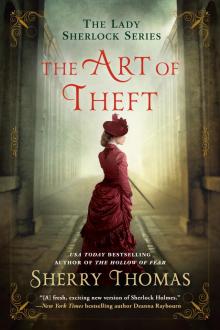 The Art of Theft
The Art of Theft The Magnolia Sword: A Ballad of Mulan
The Magnolia Sword: A Ballad of Mulan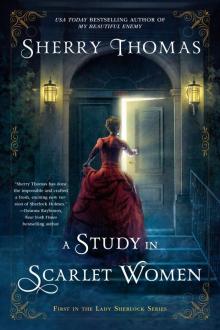 A Study In Scarlet Women
A Study In Scarlet Women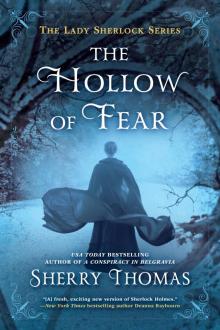 The Hollow of Fear
The Hollow of Fear The Magnolia Sword
The Magnolia Sword Beguiling the Beauty ft-1
Beguiling the Beauty ft-1 The Heart is a Universe
The Heart is a Universe The Hidden Blade: A Prequel to My Beautiful Enemy (Heart of Blade)
The Hidden Blade: A Prequel to My Beautiful Enemy (Heart of Blade) Ravishing the Heiress ft-2
Ravishing the Heiress ft-2 The Immortal Heights
The Immortal Heights The Hidden Blade
The Hidden Blade Ravishing the Heiress
Ravishing the Heiress Tempting the Bride
Tempting the Bride The Luckiest Lady in London
The Luckiest Lady in London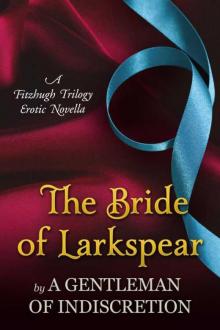 The Bride of Larkspear: A Fitzhugh Trilogy Erotic Novella
The Bride of Larkspear: A Fitzhugh Trilogy Erotic Novella Claiming the Duchess
Claiming the Duchess The One in My Heart
The One in My Heart His At Night
His At Night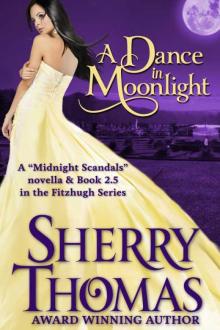 A Dance in Moonlight
A Dance in Moonlight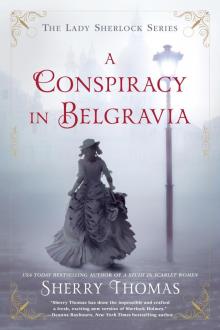 A Conspiracy in Belgravia
A Conspiracy in Belgravia Not Quite a Husband
Not Quite a Husband